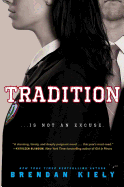
Brendan Kiely (All American Boys) begins his fourth title for young adults with a quote from Man Booker Prize winner and political activist Arundhati Roy: "There's really no such thing as the 'voiceless.' There are only the deliberately silenced, or the preferably unheard." At Fullbrook Academy, both Jules Devereux and James Baxter are "voiceless" for different reasons.
Fullbrook is an elite boarding school with lots of rules, "written and otherwise." Jules's mother, an alumna of the first class to admit women, "embraced and still lived by" these unspoken codes. Jules, too, lived by the codes until very recently, when she broke up with her wealthy, popular boyfriend and then found herself on the outside of her clique. Now a senior, Jules is determined to get into a good college and move as far away from her "mother's world" as possible. But it's difficult to continue turning a blind eye to Fullbrook's institutionalized misogyny (not to mention its racism, classicism and homophobia), and Jules wants to enact change. But how does a young woman be heard when her school wants her silent?
James Baxter accidentally injured a teammate while playing football his senior year. Now a scholarship "postgraduate" doing a fifth year at Fullbrook in hopes of hockey recruitment, he believes he's dangerous and unworthy of the future Fullbrook could give him. As he spends more time with the wealthy boys, the toxic culture begins to make him uneasy, and he forms a bond with the--according to his male teammates--"batsh*t" Jules.
Tradition takes its time delving into the toxic environment of the fictional (but not unrealistic) boarding school. Kiely handles extremely difficult issues--sexual assault, Internet shaming, substance abuse--delicately and tactfully, giving the characters the space organically to grow, learn and heal. --Siân Gaetano, children's and YA editor, Shelf Awareness

